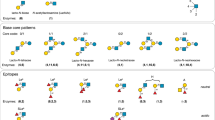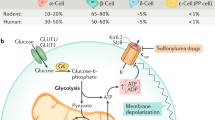Abstract
α-LACTALBUMIN has recently been recognized as a component of lactose synthetase1; it has long been known as a major protein component of milk whey2. Studies of the biosynthesis and secretion of α-lactalbumin in preparations from the lactating guinea-pig mammary gland3 indicate that the protein found in milk arises not by leakage and breakdown of mammary cells but is specifically secreted. The relatively high concentration of α-lactalbumin in milks, l mg/ml. in bovine milk4 and more than 5 mg/ml. in guinea-pig milk5, supports this view.
This is a preview of subscription content, access via your institution
Access options
Subscribe to this journal
Receive 51 print issues and online access
$199.00 per year
only $3.90 per issue
Buy this article
- Purchase on Springer Link
- Instant access to full article PDF
Prices may be subject to local taxes which are calculated during checkout
Similar content being viewed by others
References
Brodbeck, U., Denton, W. L., Tanahashi, N., and Ebner, K. E., J. Biol. Chem., 242, 1391 (1967).
Sorensen, M., and Sorensen, S. P. L., CR Trav. Lab. Carlsberg, Ser. Chim., 25, 55 (1939).
Brew, K., and Campbell, P. N., Biochem. J., 102, 265 (1967).
Bell, K., and McKenzie, H. A., Nature, 204, 1275 (1964).
Brew, K., and Campbell, P. N., Biochem. J., 102, 258 (1967).
Brodbeck, U., and Ebner, K. E., J. Biol. Chem., 241, 762 (1966).
Brew, K., Vanaman, T. C., and Hill, R. L., Proc. US Nat. Acad. Sci., 59, 491 (1968).
McGuire, E. J., Jourdain, G. W., Carlson, D. M., and Roseman, S., J. Biol. Chem., 240, PC 4113 (1965).
Turkington, R. W., Brew, K., Vanaman, T. C., and Hill, R. L., J. Biol. Chem., 243, 3382 (1968).
Brodbeck, U., and Ebner, K. E., J. Biol. Chem., 241, 5526 (1966).
Coffey, R. G., and Reithel, J., Biochem. J., 109, 169 (1968).
Lawford, G. R., and Schachter, H., J. Biol. Chem., 241, 5408 (1966).
Siekevitz, P., and Palade, G. E., J. Biophys. Biochem. Cytol., 7, 619 (1960).
Caro, L. G., and Palade, G. E., J. Coll. Biol., 20, 473 (1964).
Peters, jun., T., J. Biol. Chem., 237, 1186 (1962).
Helminen, H. J., and Ericsson, J. L. E., J. Ultrastruct. Res., 25, 193 (1968).
Brew, K., Vanaman, T. C., and Hill, R. L., J. Biol. Chem., 242, 3747 (1967).
Author information
Authors and Affiliations
Rights and permissions
About this article
Cite this article
BREW, K. Secretion of α-Lactalbumin into Milk and its Relevance to the Organization and Control of Lactose Synthetase. Nature 222, 671–672 (1969). https://doi.org/10.1038/222671a0
Received:
Issue Date:
DOI: https://doi.org/10.1038/222671a0
This article is cited by
-
The Topography of Lactose Synthesis
Journal of Mammary Gland Biology and Neoplasia (2009)
-
Metabolic Adaptations During Lactogenesis
Journal of Mammary Gland Biology and Neoplasia (2009)
-
Introduction: Alpha-Lactalbumin, a Multifunctional Protein that Specifies Lactose Synthesis in the Golgi
Journal of Mammary Gland Biology and Neoplasia (2009)
-
Subcellular compartmentation in the synthesis of the milk sugars lactose and ?-2,3-sialyllactose
Protoplasma (1990)
-
Epithelial transport of potassium
Kidney International (1977)
Comments
By submitting a comment you agree to abide by our Terms and Community Guidelines. If you find something abusive or that does not comply with our terms or guidelines please flag it as inappropriate.



